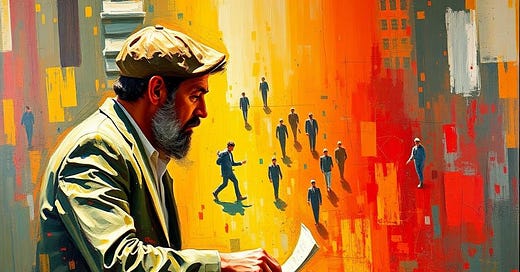Getting at the "Why" of Shared Ownership
A potential philosophical foundation for the Ownership Economy
Last week's Employee Ownership Ideas Forum was a pragmatic affair. Panels covered employee ownership financing, legal models, and management styles. They addressed how to promote employee ownership in current politics and its relationship to national security. In short: how do we get where we're going?
In particular thanks to a pair of post-conference gin and tonics and a wise conversation partner, I found myself thinking about a different question: where exactly are we going, and why?
The What and the How
Speakers throughout the conference offered different takes on the "why" behind employee ownership, a list including asset-building, financial security, worker power, firm performance and resilience, and human dignity. For some, worker ownership is an alternative to or protector against capitalism; for others it is either a way to create more capitalists.
I couldn't help but feel we'd tackled the most pressing and pragmatic questions--what are the problems and how do we solve them--without getting at that other question: where exactly are we going? Or put another way, what is the world we are trying to achieve, and what does that say about what we value?
The Why
Long before Simon Sinek and Toyota’s Five whys, influential political theorist John Rawls asked this big question about society as a whole. He argued that above all things we should pursue justice, which underpins the other things we might care about, especially liberty and equality. These are democracy’s ‘why’s.
Rawls used this focus on justice to dismiss laissez-faire capitalism1 and command economy socialism as indefensible models of society. He also took issue with our current system of welfare state capitalism, which he argued would always resist the large transfers of wealth needed to create actual equality of opportunity or a basic standard of living.
In his later work, Rawls argued that two systems could satisfy our competing desires for liberty and equality, one of which was property-owning democracy.
Property-owning democracy: "A political economy based on the wide dispersal of capital with the political capacity to block the very rich and corporate elites from dominating the economy and relevant public policies."2
Rawls didn't leave us a toolkit for how to build a property-owning democracy—or what some folks at the Aspen-Rutgers gathering last week call the ownership economy. Two academics, Martin O'Neill and Thad Williamson, took a stab. With a few of my own additions and edits, here is what a property-owning democracy might include:
More widespread ownership of housing
Cash, via a living wage or universal basic income
Broad-based stock ownership, through expanded 401ks or baby bonds
Employee ownership of workplaces
What Rawls offers employee ownership advocates is a well-developed theory to back up what we believe: that more broad-based ownership would make America more free, more equal, and more just. And as I wrote last year, it might also be the case that property-owning democracy or the ownership economy could provide the foundation for a new left-of-center (or right-of-center) political program.
The next task, if that’s right? Getting back to that pragmatic question of how to get there. A question for the 2026 Employee Ownership Ideas Forum, perhaps!
Want more? Check these out:
Last week’s The American(+) Tradition of Employee Ownership
Daniel Chandler’s book on Rawls, Free and Equal, recommended to me by Matt H. I've requested my copy from the UTA library!
- ’s book in development, We Should Own the Economy
Corey Rosen and
’s 2022 book Ownership: Reinventing Companies, Capitalism, and Who Owns What
Rawls' view was that "A laissez-fair market economy with private control of capital will tend to produce nearly unlimited inequality of outcomes as well as systemic inequality of opportunity, and will also severely compromise political liberty by slowing the rich and powerful disproportionate influence in politics and government," according to Martin O'Niell and Thad Williamson.
Property-Owning Democracy: Rawls and Beyond, by Martin O'Neill and Thad Williamson, Ed. (2012).





Wouldn’t a property-owning democracy be the same thing as an ownership economy? Is there any difference in your mind?
I've been grappling with the myriad answers to the "why" from past and current employee-owners who have generously participated in the filming of "Own It!" Each is convinced of his/her own reasons but often adds "we do things a little differently." I was wondering if the flexibility of the Kelsonian structure, which attracted me to it in the first place, had resonated with anyone else. So, it was gratifying to hear Chris Mackin tell of Senator Long's response when as a grad student Mackin asked him what could be done to make the ESOP more democratic. The Senator's answer was, "Don't tell them what they should do. Give them the foundation and let them make it as democratic as they want to." That, to me, is what democracy is all about.